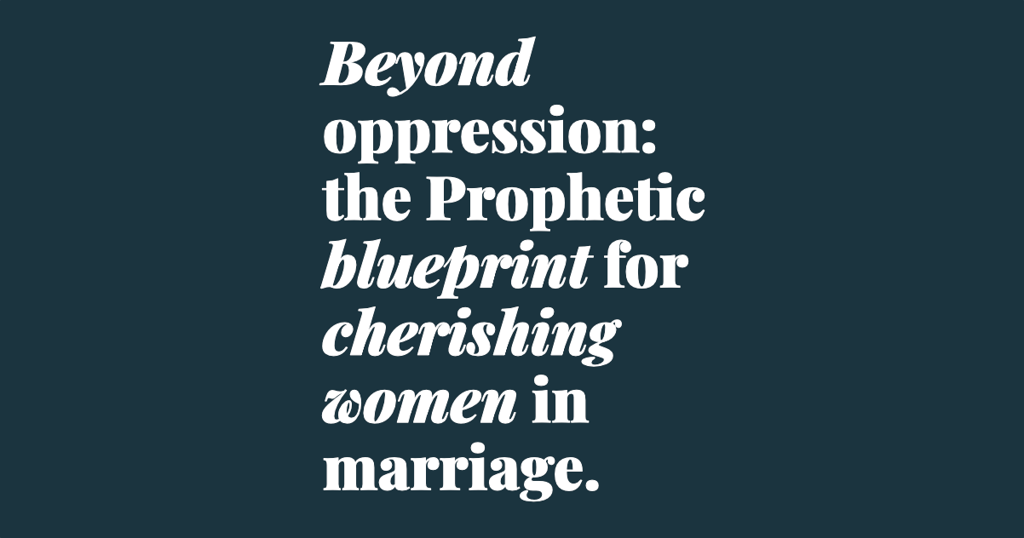Beyond oppression: the Prophetic blueprint for cherishing women in marriage
Imam Mohammad Aasim Mirza
7/26/20193 min read


Women. Throughout history, they have faced oppression and injustice at the hands of those who exploit their perceived vulnerability. Yet, it is not weakness that defines women, but an extraordinary strength—a strength that allows them to endure generational challenges since time immemorial imposed by sexist, bigoted and tyrannical men. These women, remarkable in their resilience, often bear the weight of physical and emotional abuse for the entirety of their married lives. However, this endurance, while admirable, is a testament to their strength, not a justification for the oppression they suffer. Importantly, such treatment is entirely contrary to the sunnah—Prophetic example.
The blessed Prophet صلى الله عليه وآله وسلم set an unmatched example of kindness, respect, and love towards his wives. He showed us that marriage is not a platform for dominance, but a partnership built upon mutual care, compassion, and devotion. As Allah عزوجل says in the Qurʾān (30:21):
وَمِنْ ءَايَـٰتِهِۦٓ أَنْ خَلَقَ لَكُم مِّنْ أَنفُسِكُمْ أَزْوَٰجًۭا لِّتَسْكُنُوٓا۟ إِلَيْهَا وَجَعَلَ بَيْنَكُم مَّوَدَّةًۭ وَرَحْمَةً ۚ إِنَّ فِى ذَٰلِكَ لَـَٔايَـٰتٍۢ لِّقَوْمٍۢ يَتَفَكَّرُونَ
“Another of His signs is that He created spouses from among yourselves for you to live with in tranquillity: He ordained love and kindness between you. There truly are signs in this for those who reflect.”
This verse demonstrates that the primary purpose of marriage between man and woman is to achieve peace of mind. Such peace can only be attained when there is mutual recognition of each other’s rights and a sincere effort to fulfil them. If, however, each partner focuses solely on demanding their own rights, it will inevitably lead to domestic conflicts and the breakdown of harmony.
One way to ensure the fulfilment of these rights could have been to rely solely on legislation and the enforcement of laws, as is done in other areas of life where usurping the rights of others is prohibited, however, we gather from human experience that people cannot be truly reformed merely by being given a set of rules. True transformation requires nurturing taqwā—God-consciousness—within our hearts. For this reason, whenever the Qurʾān issues commandments regarding social interactions, it complements them with the exhortation to ittaqi ‘Llāh—fear Allah—emphasising the spiritual dimension alongside the legal framework.
There was no one better than the blessed Prophet صلى الله عليه وآله وسلم to exemplify what a balanced, fair and God-conscious marital relationship should look like. His treatment of his wives—both in private and public—stands as a timeless model for how husbands should behave towards their spouses. The blessed Prophet صلى الله عليه وآله وسلم had the highest standards of married life, teaching us to love, cherish, and honour our wives as companions and equals.
One narration beautifully illustrates the Prophet’s صلى الله عليه وآله وسلم attentiveness to his wife, ʿĀʾishah رضي الله عنها, even in matters as simple as a meal:
عَنْ أَنَسٍ أَنَّ جَارًا لِرَسُولِ اللَّهِ صَلَّى اللَّهُ عَلَيْهِ وَ اٰلِه وَسَلَّمَ فَارِسِيًّا كَانَ طَيِّبَ الْمَرَقِ فَصَنَعَ لِرَسُولِ اللَّهِ صَلَّى اللَّهُ عَلَيْهِ وَسَلَّمَ ثُمَّ جَاءَ يَدْعُوهُ فَقَالَ وَهَذِهِ لِعَائِشَةَ فَقَالَ لَا فَقَالَ رَسُولُ اللَّهِ صَلَّى اللَّهُ عَلَيْهِ وَسَلَّمَ لَا فَعَادَ يَدْعُوهُ فَقَالَ رَسُولُ اللَّهِ صَلَّى اللَّهُ عَلَيْهِ وَسَلَّمَ وَهَذِهِ قَالَ لَا قَالَ رَسُولُ اللَّهِ صَلَّى اللَّهُ عَلَيْهِ وَسَلَّمَ لَا ثُمَّ عَادَ يَدْعُوهُ فَقَالَ رَسُولُ اللَّهِ صَلَّى اللَّهُ عَلَيْهِ وَسَلَّمَ وَهَذِهِ قَالَ نَعَمْ فِي الثَّالِثَةِ فَقَامَا يَتَدَافَعَانِ حَتَّى أَتَيَا مَنْزِلَهُ
Anas رضي الله عنه reported, the blessed Prophet صلى الله عليه وآله وسلم, had a Persian neighbour who was known for preparing delicious soup. The neighbour invited the Prophet صلى الله عليه وآله وسلم to share a meal, and the Prophet صلى الله عليه وآله وسلم asked, “And what about my wife, ʿĀʾishah?” The man declined, so the Prophet صلى الله عليه وآله وسلم declined. The neighbour returned another time to invite the Prophet صلى الله عليه وآله وسلم, who again asked, “And what about my wife?” The neighbour again declined, and the Prophet صلى الله عليه وآله وسلم declined as well. On the third occasion, when the neighbour finally agreed to include ʿĀʾishah, the Prophet صلى الله عليه وآله وسلم accepted the invitation. The two went together, walking side by side, until they reached the man’s house. — Muslim #2037
This incident may seem simple, but it carries profound lessons about the principles of married life. Imam al-Nawawi, in his commentary on this narration, writes: “The Prophet صلى الله عليه وآله وسلم disliked attending a special meal without her, for this is among the beauties of married life, the rights of companionship, and the emphasised manners of gathering.” Truly, the Prophet’s صلى الله عليه وآله وسلم consideration for ʿĀʾishah رضي الله عنها in this instance is a reflection of the love and respect that should define a marital relationship.
Subḥān Allāh! Such was the character of the blessed Prophet صلى الله عليه وآله وسلم, who valued and uplifted the status of women, treating his wives with dignity and tenderness. He demonstrated, through his actions, that women are not to be belittled or mistreated but cherished and honoured as essential companions in life’s journey.
May Allah عزوجل grant us the ability to follow the sunnah of the blessed Prophet صلى الله عليه وآله وسلم, not selectively or when convenient, but consistently and to the best of our abilities. Let us reflect on his example and strive to embody his teachings in our relationships, fostering a spirit of love, kindness, and mutual respect.
And Allah عزوجل and His Messenger صلى الله عليه وآله وسلم know best.
